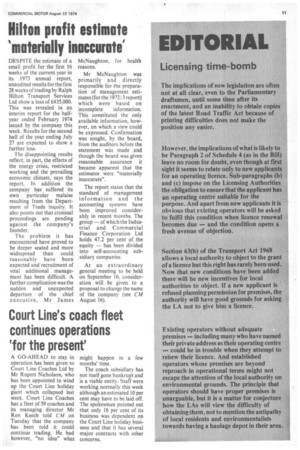Licensing time bomb
Page 13

If you've noticed an error in this article please click here to report it so we can fix it.
The implications of new legislation are often not at all clear, even to the Parliamentary draftsmen, until some time after its enactment, and an inability to obtain copies of the latest Road Traffic Act because of printing difficulties does not make the position any easier.
How ever, the implications of what is likely to be Paragraph 2 c)f Schedule 4 (as in the Bill) leave no room for doubt, even though at first sight it seems to relate only to new applicants or an operating licence. Sub-paragraphs (b) and (c) impose on the Licensing Authorities the obligation to ensure that the applicant has an operating centre suitable for the purpose. And apart from new applicants it is obvious that existing operators will be asked to fulfil this condition when licence renewal becomes due — and the condition opens a fresh avenue of objection.
Section 63(b) of the Transport Act 1968 allows a local authority to object to the grant of a licence but this right has rarely been used. Now that new conditions have been added there will be new incentives for local authorities to object. If a new applicant is refused planning permission for premises, the authority will have good grounds for asking the LA not to give him a licence.
Existing operators without adequate premises — including many who have named their private address as their operating centre — could be in trouble when they attempt to renew their licence. And established operators whose premises are beyond reproach in operational terms might not escape the attention of the local authority on environmental grounds. The principle that operators should have proper premises is unarguable, but it is a matter for conjecture how the I.As will view the difficulty of obtaining them, not to mention the antipathy of local residents and environmentalists towards having a haulage depot in their area.






























































































